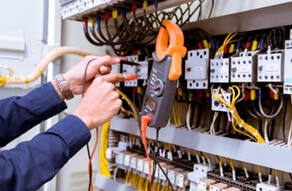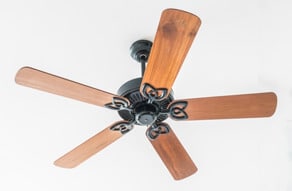Call us now
0439 823 190Common Smoke Alarm Problems
Posted on June 4, 2021

Common smoke alarm problems are often caused by people not understanding how to properly use them. From where the smoke alarm is installed to how long it has been since the smoke detector has been tested. Smoke detectors work to alert people of fires so ensuring they are working correctly is important. The Local Electrician offers professional smoke alarm maintenance and installation services performed by our certified Emergency Electrician workers.
The common smoke alarm problems are:
- The smoke alarm is located in an ineffective or poor position
- The sensitivity of the smoke alarm is wrong making it cause false alarms often
- Steam or high humidity levels cause the smoke alarm to beep
- Insects crawling inside the smoke alarm causing it to go off
- Dust buildup has blocked and disrupted the alarm
- Strong chemicals, often from cleaning or during renovations, have caused multiple false alarms
- Batteries need replacing as the alarm is not working properly or at all
What are Common Smoke Alarm Problems?
The main types of common smoke alarm problems are:
Smoke Alarm Location
The smoke alarm can be located in a spot where it often goes off and causes false alarms. If the smoke alarm is within three metres of a cooking appliance or area then the smoke will often activate the alarm. Often if the alarm is near the kitchen where appliances such as the toaster, stove or oven can lead to the false alarm.
Photoelectric smoke alarms might also sound even if the temperature in the room increases due to the level of technology built into them. Installing a smoke alarm near a window or door can also cause smoke alarms. This can be because of outside interfering with the smoke alarm’s sensors that are built for indoor use. The illusion of smoke from particles outside that have drifted inside can lead to the alarm going off.
Sensitive Smoke Alarms
Similar to the location of the smoke alarm, the alarm might be wired to sensitivity. Sensitive-wired smoke alarms might ring when food is slightly overcooked even if it is placed further away from cooking locations. Ensure to refer to the user’s manual to know what setting the smoke alarm’s sensitivity should be set at.
Humid Levels and Steam
Smoke alarms chirping might be occurring from the humidity levels or from steam. If the smoke alarm is located outside or near the bathroom or location where steam is present this can cause the alarm to ring. The dense moisture particles can confuse the smoke detector thinking that they are smoke particles. High humid levels can also cause the alarm to be confused and think smoke is present.
Insect Issues
Insects might infest the smoke alarm often where the smoke would enter the detector. When they sit inside there it will block the smoke detectors from picking up if there is smoke present. The insect inside of the smoke alarm might be the cause for the alarm not correctly functioning.
Dust Buildup
A buildup of dust can lead to the smoke detector not working properly or at all. A vacuum brush can easily resolve this problem as dust will block the sensors from picking up smoke.
Strong Chemicals
If the alarm is too sensitive then when cleaning or renovating most times the alarm might confuse the strong chemicals for smoke. The chemicals might even cause a false alarm for a properly configured smoke detector. When activities involving stronger chemicals are present this can lead to the alarm confusing the particles as smoke.
Dead Batteries
Sometimes the smoke alarm will not work at all because the batteries inside are flat. Different types of smoke alarms will need different batteries depending on their size or model. Replacing the batteries might also be needed if there is a beeping smoke alarm or if there is a high-pitched continuous sound.
Changing the batteries to see if the sound stops should occur first. If the detector keeps ringing then likely the smoke alarms need to be replaced.
How do I Resolve Smoke Alarm Problems?
The best ways to fix smoke alarm problems are to:
- Move the location of the smoke detector away from cooking areas, doors or windows and places where steam is present or the location is humid
- Adjust the sensitivity levels of the alarm to ensure that it does not get confused with other particles
- Inspect the alarm regularly for insects that may interfere with the wiring of the smoke alarm
- Check the alarm to ensure that dust has not built up inside of the detector at least once a year
- If strong chemicals are nearby, such as from heavy cleaning or renovations, be aware that the alarm might go off. Do not turn it off to ensure that if there is a fire people can be aware
Undergo regular smoke alarm maintenance checks to ensure that each one is working correctly and if the batteries need replacing
Reliable Smoke Alarm Emergency Electrician Services
Here at The Local Electrician our smoke alarm emergency electricians will be able to resolve all smoke alarm problems. Each fully qualified electrician understands how to install, repair, replace and perform maintenance work on any smoke alarm. We will give you peace of mind knowing that an experienced electrician has ensured that the smoke alarm is working inside your home.
No matter the hours we will work with smoke alarms in all suburbs, including the Northern Beaches and Inner West. Our Level 2 Electrician team is here to help with more advanced electrical tasks where we will guarantee successful completions.

For trusted smoke alarm emergency electricians to resolve smoke alarm problems – rely on The Local Electrician today!
Lifetime Warranty on Workmanship and Labor
Our Services
Our skilled electricians are qualified to carry out any electrical repair or installation within Sydney. We strive to deliver absolute customer satisfaction by offering electrical services that are affordable, safe and long lasting.
- Private Power Pole Installation: What Sydney Homeowners Need To Know - November 29, 2023
- Understanding Power Outages: When To Call a Level 2 Electrician - November 14, 2023
- Understanding Level 2 Electrical Needs: FAQs for Sydney Homeowners - October 7, 2023
Our Level 2 Local Electrical Services










